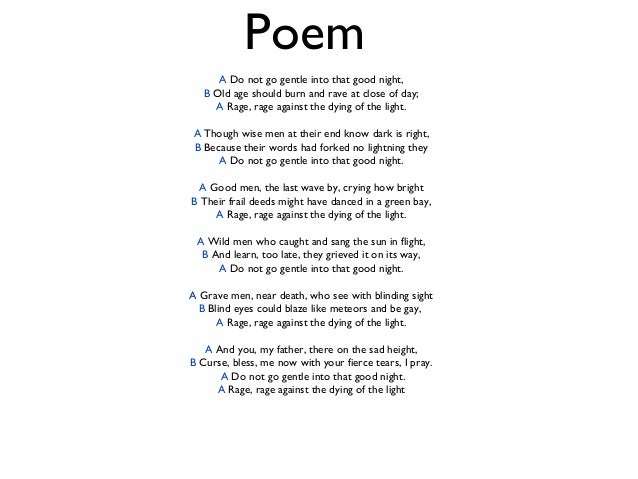
Thomas is arguing that old people should not agree to die immediately.

In comparison to the poem ‘If-‘ written in a lyrical tone and exploring ideas to life, ‘Do not go gentle into that good night’ is life or death written with a persuasive tone. He then explores the idea of perseverance and never giving up ‘except the Will which says to them: ‘Hold on!’’ and finally he talks about achieving greatness and ends the poem with ‘you’ll be a man my son!’ showing Kipling is presenting the great strength in becoming a man. He also continues the poem to give advice on our thoughts and actions: we should think and dream, but not let these thoughts control us. Kipling talks about staying strong and clear headed, ‘If you can keep your head when all about you’ even if others are against us. In the poem, ‘the Will’ is mentioned refencing to ‘willpower’ which is the motivational force within humans. It is intended to inspire the readers and give advice of how to be, how to act, how to not repeat bad actions and what to avoid in life. Despite his flaws, Antonio's character ultimately stands in contrast to the greedy and calculating nature of Shylock, making him a compelling and memorable character in the play.Similarly in the poem ‘If-‘ the same passionate, motivational tone is used through the speakers voice. He is depicted as both melancholic and generous, and his selfless actions and willingness to forgive show his kindness and compassion. In conclusion, the character of Antonio in "The Merchant of Venice" is a complex and multi-dimensional individual. He is willing to forgive Shylock for demanding a pound of flesh as repayment for a debt, showing a level of mercy and understanding that is lacking in the character of Shylock. While Shylock is greedy and calculating, Antonio is selfless and compassionate.

Throughout the play, Antonio's character is contrasted with that of the Jewish moneylender Shylock. This is exemplified in his willingness to offer financial support to Bassanio, even though it puts his own financial stability at risk.

He is quick to offer assistance to his friends and is always willing to lend a helping hand. This melancholic disposition is likely a result of Antonio's deep love for his friend Bassanio, who he is willing to do anything to help, even going so far as to put up his own life as collateral in a risky business deal.ĭespite his sadness, Antonio is also shown to be a kind and generous individual. He is prone to fits of sadness and depression, and he often speaks about death and the fleeting nature of life. In William Shakespeare's play, "The Merchant of Venice," the character of Antonio is portrayed as a complex and multi-dimensional individual.Īt first glance, Antonio appears to be a wealthy and successful merchant, but he is also depicted as a melancholic and melancholy figure.


 0 kommentar(er)
0 kommentar(er)
